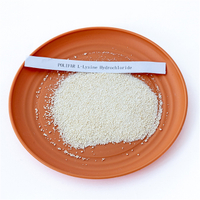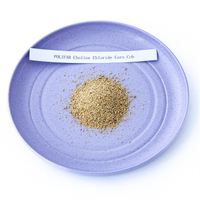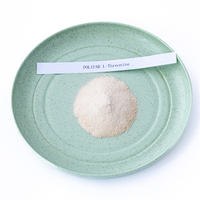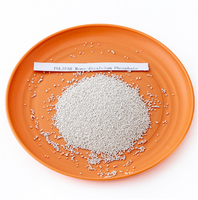| Availability: | |||||||||
|---|---|---|---|---|---|---|---|---|---|
| Color: brown or light brown granule Sales Models: wholesale Min Order: 10mt Shelf Life: Two years when properly stored Packing: Net 25kg/750kg/800kg in Plastic woven bags with PE lining Storage: stockpiled at the ventilated place, avoiding rain, moisture and insolation. Please handle with care to prevent bag damage, store away from toxic substances. | |||||||||
| CAS No.: | 60343-69-3 | Other Names: | L-Lysine Sulphate 70% |
| Molecular formula: | C6H14N2O2.H2SO4 | EINECS No.: | 200-294-2 |
| Place of Origin: | China | Type: | Feed grade amino acid |
| Efficacy: | promote growth | Brand Name: | Polifar |
| Model Number: | Feed additives | Appearance: | Powder |
| Shelf Life: | 2 years | MOQ: | 1000kg |
| Sample: | Free,≤500g |
Lysine is a kind of amino acid, which can not be compounded in the animal body. It plays an important role in metabolism. it has the function of increasing the practical utilities of feed, improving the meat quality, and promoting the growth of animals. It is especially useful for rumen animals such as milk cattle, meat cattle, sheep, and so on. It is a kind of good feed additive for ruminants.
Lysine sulfate 70% is a high-density dustless fluidity particle. It is combined with 55%of pure lysine(about 70% lysine sulfate), and it also has more than 15% of another amino acid, which can provide with animal full and balanced nutrition needed. It is the limiting amino acid for pigs and the second for poultry. The level of dietary l-lysine concentration significantly influences growth performance and feed efficiency. Supplementing l-lysine in dietary could balance the amino acid profile in the formula and fulfill the requirements of animals to optimize the technical-economic result of production.
| CAS No.: | 60343-69-3 | Other Names: | L-Lysine Sulphate 70% |
| Molecular formula: | C6H14N2O2.H2SO4 | EINECS No.: | 200-294-2 |
| Place of Origin: | China | Type: | Feed grade amino acid |
| Efficacy: | promote growth | Brand Name: | Polifar |
| Model Number: | Feed additives | Appearance: | Powder |
| Shelf Life: | 2 years | MOQ: | 1000kg |
| Sample: | Free,≤500g |
Lysine is a kind of amino acid, which can not be compounded in the animal body. It plays an important role in metabolism. it has the function of increasing the practical utilities of feed, improving the meat quality, and promoting the growth of animals. It is especially useful for rumen animals such as milk cattle, meat cattle, sheep, and so on. It is a kind of good feed additive for ruminants.
Lysine sulfate 70% is a high-density dustless fluidity particle. It is combined with 55%of pure lysine(about 70% lysine sulfate), and it also has more than 15% of another amino acid, which can provide with animal full and balanced nutrition needed. It is the limiting amino acid for pigs and the second for poultry. The level of dietary l-lysine concentration significantly influences growth performance and feed efficiency. Supplementing l-lysine in dietary could balance the amino acid profile in the formula and fulfill the requirements of animals to optimize the technical-economic result of production.
Standard | Result | |
L-Lysine H2SO4 (on dry basis)/% | ≥70 | 70.2 |
L-Lysine (on dry basis)/% | ≥55 | 55.39 |
PH | 3~6 | 3.68 |
Loss on Drying/% | ≤1.00 | 0.50 |
Residue on Ignition/% | ≤0.30 | 0.20 |
Dust/% | ≤0.30 | 0.20 |
Ammonium Salt/% | ≤0.04 | 0.01 |
Heavy Metal(Pb)/% | ≤0.0030 | 0.0020 |
Arsenic(As)/% | ≤0.0010 | 0.0002 |
Standard | Result | |
L-Lysine H2SO4 (on dry basis)/% | ≥70 | 70.2 |
L-Lysine (on dry basis)/% | ≥55 | 55.39 |
PH | 3~6 | 3.68 |
Loss on Drying/% | ≤1.00 | 0.50 |
Residue on Ignition/% | ≤0.30 | 0.20 |
Dust/% | ≤0.30 | 0.20 |
Ammonium Salt/% | ≤0.04 | 0.01 |
Heavy Metal(Pb)/% | ≤0.0030 | 0.0020 |
Arsenic(As)/% | ≤0.0010 | 0.0002 |
| Product Storage: | Stockpiled at the ventilated place, avoiding rain, moisture and insolation. Please handle with care to prevent bag damage, store away from toxic substances. |
| Product Packaging: | Net 25kg/750kg/800kg in Plastic woven bags with PE lining |
| Loading: | 18MT/20FCL'; 14~16MT/20FCL' with pallets |
| Delivery: | About 1 - 2 week |
| Product Storage: | Stockpiled at the ventilated place, avoiding rain, moisture and insolation. Please handle with care to prevent bag damage, store away from toxic substances. |
| Product Packaging: | Net 25kg/750kg/800kg in Plastic woven bags with PE lining |
| Loading: | 18MT/20FCL'; 14~16MT/20FCL' with pallets |
| Delivery: | About 1 - 2 week |
Q1: What factors can affect the effectiveness of lysine sulfate in animal feed?
Several factors can influence the effectiveness of lysine sulfate in animal feed. These include the formulation of the feed, as the balance of amino acids and other nutrients can impact lysine utilization. Additionally, feed processing methods such as pelleting or extrusion can affect lysine stability. The quality of feed ingredients, including lysine sulfate itself, is also crucial, as variations in quality can impact its efficacy. Furthermore, animal-specific factors such as species, age, and health status, as well as environmental conditions like temperature and humidity, can affect lysine absorption and utilization in animals. Overall, attention to these factors is essential to ensure the optimal effectiveness of lysine sulfate in animal feed formulations.
Q2: Can lysine sulfate be used in all stages of animal production?
A2: Yes, lysine sulfate can generally be used in all stages of animal production. It is commonly incorporated into starter, grower, and finisher diets to support optimal growth and performance in poultry, swine, and other livestock species. Additionally, lysine sulfate may be included in diets for breeding animals to support reproductive health and offspring development. However, it's important to formulate diets based on the specific lysine requirements of different animal species, ages, and production goals to ensure adequate nutrition and optimal performance throughout all stages of production.
Q1: What factors can affect the effectiveness of lysine sulfate in animal feed?
Several factors can influence the effectiveness of lysine sulfate in animal feed. These include the formulation of the feed, as the balance of amino acids and other nutrients can impact lysine utilization. Additionally, feed processing methods such as pelleting or extrusion can affect lysine stability. The quality of feed ingredients, including lysine sulfate itself, is also crucial, as variations in quality can impact its efficacy. Furthermore, animal-specific factors such as species, age, and health status, as well as environmental conditions like temperature and humidity, can affect lysine absorption and utilization in animals. Overall, attention to these factors is essential to ensure the optimal effectiveness of lysine sulfate in animal feed formulations.
Q2: Can lysine sulfate be used in all stages of animal production?
A2: Yes, lysine sulfate can generally be used in all stages of animal production. It is commonly incorporated into starter, grower, and finisher diets to support optimal growth and performance in poultry, swine, and other livestock species. Additionally, lysine sulfate may be included in diets for breeding animals to support reproductive health and offspring development. However, it's important to formulate diets based on the specific lysine requirements of different animal species, ages, and production goals to ensure adequate nutrition and optimal performance throughout all stages of production.








